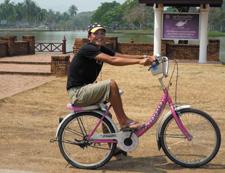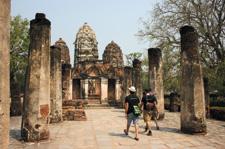
TALKING BUDDHA. Biking around the ancient capital of Sukhothai was a highlight of a recent tour of Thailand but it was our gay guide Tong (above) who proved most fascinating. Credit: Gordon Bowness
We’re drunk on Mekong rice whiskey and Coke, hurtling through the dark on the overnight train from Bangkok to Chiang Mai.
Four of our group settle onto the blue vinyl benches in the dingy dining car; colourful little whirligigs cut from aluminium drink cans twirl from the ceiling vents. A portable stereo is blaring Western hits: “Funky Town,” “Songs of Love,” “YMCA.” Our tour guide Ronnachai Naprom, or Tong (everyone uses a nickname in Thailand), a former kickboxer who once starred in an Adidas swimwear campaign (?!), kibitzes with the waitresses and porters — he knows them all from having done this trip many times with many groups. He announces immediately that we are all gay; the waitresses are both disappointed and intrigued. The mood is flirty and fun.
When the party kicks into high gear it’s one of those moments you dream of when setting off on vacation — a drunken, hilarious event, dangerous even, shared with locals.
This is only the second night of a plum assignment, joining a group of seven — four journalists, two civilians and the coowner of the organizing tour company Out Adventures — on a whirlwind guided tour of Thailand. The tour owners hope we journalists will showcase the upstart Toronto-based company’s approach to world travel: taking small groups of queers and queer families beyond the gay beaten path of cruises, beach resorts and big discos. In Tong’s words, “The gay place and the fun place sometimes is not in the same place.” Chains like the Hilton and 7-Eleven are avoided in favour of small local businesses. Culture and local contact are as much a focus as fun and sun — hence the second-class sleeper births on the train to Chiang Mai. You could fly for about the same price but the 13-hour train ride is featured on most Out Adventures tours through Thailand. It’s a chance to connect.
One journalist from New York is tall, youthful and fair. The waitresses like him. The only jokes across the language barrier ape the hooker banter common to the streets. “Want my picture? Fifty baht.” Or the waitress shows a bit of cleavage and says, “Hundred baht.” The New Yorker responds in kind. Playful slaps reveal his ticklishness and an endearingly girly squeal. A waitress goes in for the kill, tickling him till he can’t breathe. She smells a ladyboy (the common English translation for the Thai word kathoey; or trans). Out come some dangly earrings, a Hello Kitty headband and lipstick. The easy-going writer goes for it, ties up his T-shirt into a halter and struts his stuff. The dining car explodes into laughter and dancing.
Even after he sits down the fun continues as porters and waitresses come off shift, eating and drinking at the table beside us. The Thais love a ladyboy, especially a 6’2” “farang” ladyboy. We’re a hit.
Tong finally translates one of the spunky waitress’s jokes. “I’d bring him home for 2,000 baht,” she’d said, pointing at our Tranny Trainwreck, “but I don’t trust my husband.”
Gay and trans identities are in a strange state of flux right now. The Thai kathoey tradition has a long history of acceptance and various trans folk, from effeminate young males to post-op transexuals, are visible — or not — at all levels of society, from rural night markets to popular TV shows. There’s even a ladyboy pop band called Venus Flytrap. On our trip we see ladyboys, even butch women, everywhere. But our Western notion of gay is a more recent arrival and it’s created some confusion especially in the rural areas.
“[Being gay] is not new; it’s been here for generations,” says Tong, “but the word ‘gay’ is new. In Thailand the word ‘gay’ is an English word; in Thai we call ‘kathoey.’ But Thai language is kind of funny…. When we say ‘gay,’ gay means like me, happy with what I have, not dress like a girl. But the word ‘kathoey’ means dress like a queen, [wanting] to change, with moobs [man boobs] and chop chop. So we call them kathoey.”
One reason why gay and lesbian keeps getting mixed up with trans is because there are many more categories of trans in Thailand than in the West, says American John Goss, founder of the Bangkok-based website Utopia-Asia.com, now considered the main web portal for all things queer in Asia. What’s new is the idea of “manly men loving manly men,” says Goss. Patriarchal notions of karma mean that women who act like men are seen as gaining status while men who act like women lose status. “Nevertheless beauty and polite behaviour are so highly valued in Thailand that ladyboys may rise very high in society, despite the seedy reputation of kathoey, if they work hard to gain respect,” writes Goss in an email.
Thailand is a very religious and reverent Buddhist country of 65 million. It’s also an incredibly welcoming place for queers. “I feel lucky I was born in Thailand, and I was born in a period when society accept about being gay,” Tong says. “In Thailand to come out right now is really easy. Of course it’s easy to say but not easy to do because in Asian culture, saving face is pretty much one of the first things we do. They will do anything to [save] face.” In other words most people have no problems with queer kids — as long as they’re someone else’s kids. Sounds familiar.
Saving face, keeping up appearances, blurs the boundaries of tolerance. The Thais are a decorous people: They don’t like skimpy clothing, they don’t raise their voices in public and they don’t kiss on the streets. As an outsider it’s hard to tell if it’s all about manners or if it’s about keeping queers on the down low. For the queer record: Tong says holding hands is okay.
“Western culture, you can make out on the street, kissing and things like that, you know, it’s very normal for you — lovely and cute,” says Tong. “But in Thailand you can’t…. I think if a lot of gay foreigner come to Thailand and they started doing that and it happened many times, later on it’s going to become a big issue.
“But if you respect our culture I believe you won’t have any trouble at all.”
Public displays of queerness did become a big issue the week prior to our arrival in Thailand. The second annual Chiang Mai Pride on Feb 21 was called off after a 100-strong gang of Red Shirt thugs, supporters of the corrupt former prime minister Thaksin, surrounded organizers on the day and threatened violence if the parade went forward. They claimed that kathoeys and gays marching in public was a desecration of the culture of Chiang Mai, the northern city seen as the heart of traditional Thai culture.
But Pride organizer Prongthorn Chanlearn feels this move by the Red Shirts doesn’t represent any societal shift toward intolerance — at least not yet.
“For the Chiang Mai culture, most of them respect the third sex identity,” says Prongthorn who runs Mplus, a group doing public outreach and AIDS education among gay and trans sex workers. “We cannot interpret this as Chiang Mai not respecting them.
“I think this is a politics issue.”
The Pride event is supported by the municipal government where many officials are in the Yellow Shirt camp, the group that helped oust Thaksin and bring the current prime minster to power. The Red Shirts are using queer rights as a wedge issue and a way to get attention.
“Gay Pride was very popular, very famous,” says Prongthorn. “The [Red Shirts] would like to show power during our Gay Pride. So they try to identify themselves as cultural defenders and try to attack us.”
A week later we gay outsiders can remain oblivious to such political maneuvers. There is never a moment of self-consciousness or self-censoring anywhere we go in Thailand, let alone discomfort or fear — unless you count being uptight when Tong tries to get us all same-sex dancing to the cover band on a river boat dinner cruise in Bangkok. The fabled land of smiles delivers on its promise.
***
I would never go on a guided group tour before this trip. I’ve had some great adventures travelling solo but, admittedly, I’ve also spent way too much time alone when I travel, a silent observer, talking to no one. This trip to Thailand was fascinating and not just for fascinating Thailand itself, but for the experience of group travel.
There’s always an element of chance; one person can ruin it for the group. But there is no prima donna or curmudgeon on our trip. Granted, it takes some effort to socialize continuously with a group of media savvy gay men. Why is one guy from Toronto reading Toronto Life as our first glimpses of the Thai countryside race by?
Gays take up a lot of space. Sometimes we’re as loud as cicadas at noon in the scorching Thai forest. Crazy making.
And for all our desire to make connections with locals, we’re overly reliant on our guide. The poor man is constantly at our beck and call. At times it feels like he’s a servant.
Tong rolls his eyes when I press him about the guide/group relationship. “It’s hard work,” he admits. “The worst is when I get calls to fix the toilet. That’s not my job. Call the hotel manager yourself.”
But he’s there and he speaks the language.
I’m the only one of the group who’s brought a Thai phrase book. That only means I use seven phrases of Thai to everyone else’s four. Aren’t I clever? Desperate to say something to a 72-year-old man peddling me around town on his cyclo, I try to tell him how strong he is. He immediately stands up and pedals harder. Oh, God. I think I’ve told him to go faster.
Where’s Tong when I need him?
Like any trip, there are hits and misses. The hits include a bike ride through the 13th-century capital of Sukhothai, being molested by elephants in Lampang and the train party. The misses include a grand dinner theatre for traditional dance in Chiang Mai that devolves into farcical mime drumming and participatory dancing and the mortifying cyclo ride.
But any deficits of guided group travel are easily outweighed by the benefits of having such an interesting character like Tong be our window onto the culture. He’s just one of around 40 Thai guides hired by the Aussie company Intrepid with which Out Adventures is affiliated. The few guides we meet on the trip are all characters, big personalities. But Tong is special; he’s nobody’s fool.
The self-described jungle boy shared his story on the train: He’s from a poor, remote village in the northeast and lost both his parents when he was nine. He raised a younger sister on his own, working any odd job he could find, including fighting. His education was occasional at temple schools, but he eventually won scholarships to study at university in Bangkok and abroad.
Growing up there was only one house with a television in Tong’s village and everyone would watch it. “Every evening I would go first to sit in the front row,” says Tong. “I would sit there and dream. Because I can-not even have shoes…. It’s just impossible. I want to have a job that I can travel and see the world. And visit all these places and learn about all the different countries and meet all the different people who are opposite me, you know, bigger nose, whiter skin and taller, thin lips.
“So when I get this job, it becomes my dream job.”
He’s worked with Intrepid for two and half years and loves it. Tong is an avid Thailand booster and cultural ambassador. “I know we are poor, but we are happy with what we got. In many ways we can’t compare to developed countries like Europe or North America, Canada even. In a lot of different ways you got a better life. But it’s not about what you have really. Because with my job I’ve met a lot of people and the thing is they’re not really happy with what they have. I’m happy with what I have here. It’s not about how much money you have, it’s about how you make yourself happy with your life.
“That’s the difference between the life of the poor and the rich. I’m talking about the rich people who don’t want to spend. Why don’t you spend it? You can afford it and it makes you happy and you want to do it. Do it. That’s my life philosophy.”
It’s hard to imagine someone so irrepressible is still grieving the death of his fiancé who was struck by a car just over a year ago; they had been together for five years.
Tong is a fitting representative of his country. Thailand, too, has been knocked for a loop, beginning with the financial crisis of 1997, then SARS, bird flu, the tsunami and recent political and economic troubles. The bottom has fallen out of the mainstay tourism industry. But there are inner resources at work here that sojourners can only guess at.
Speaking for his own story Tong shrugs off any notion that he’s special. “I will make myself stand up and fight because I can’t give up,” he says. “Whatever happens I am able to laugh. Really, whatever happens I laugh about everything. I pause. I may get sad for one or two minutes. And then the next minute I laugh. Oh, shit happens. Oh no, again, not again. And I laugh. Because I’m always happy. Because what can you do? You can’t fix the past. The past is past.”


 Why you can trust Xtra
Why you can trust Xtra